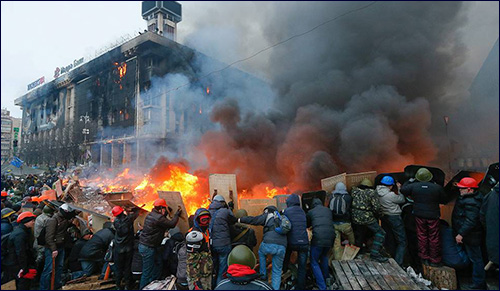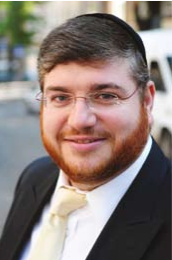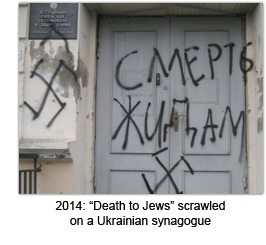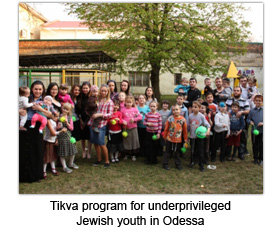 An Open Letter to University Presidents
An Open Letter to University Presidents


5 min read
Odessa's Jewish community leader speaks out on threats of violence. An Aish.com exclusive.
As luck would have it, the Great Choral Synagogue is located not just in Odessa's central district, but at the epicenter.
 It is the last place a Jew would want to be during the current Ukrainian civil unrest, where local militias have seized government buildings and police stations, and where running street battles have claimed thousands of casualties.
It is the last place a Jew would want to be during the current Ukrainian civil unrest, where local militias have seized government buildings and police stations, and where running street battles have claimed thousands of casualties.
The two sides facing off: those who favor increased Russian influence in Ukraine, versus those who seek more independence and closer ties to the European Union.
This weekend, Rabbi Refael Kruskal of Odessa isn't taking any chances. He has moved nearly 1,000 Jews out of the city and to a rural retreat.
When there's trouble, Jews always seem to be caught in the middle.
"When there's trouble, Jews always seem to be caught in the middle," says Rabbi Kruskal who, as CEO of the Tikva social services network of in Odessa, is responsible for hundreds of orphaned children, college students and the elderly.
"I hesitate to use the word evacuation, which has emergency connotations," he told Aish.com. "We are taking the students to an environment where they're able to feel more relaxed."
This weekend is a double-barreled powder keg. On Friday (May 9, 2014), fierce gun battles left a police officer and dozens more dead on Victory Day – the anniversary of Russia’s defeat of Germany in WWII. On Sunday, Ukrainians take to the polls for a controversial referendum on the secession of Donetsk in eastern Ukraine.
The temporary evacuation of Odessa Jewry began as a security precaution, yet Rabbi Kruskal – having mastered the art of creating positive educational opportunities – brought in a special speaker from Israel and reconceived it as a long weekend retreat.
"We don't want to get caught in the middle," he said. "At such times it's best for the Jewish community to keep our head low and stay off the streets."
Ever since last November, when pro-Russian forces began agitating, Ukrainian Jewry has felt the heat.

The 1941 Odessa Massacre saw 80% of the 210,000 Jews murdered.
Odessa, a Black Sea shipping port, is already soaked in Jewish blood. Throughout the 19th century when Jews comprised some 40% of the city's population, a succession of deadly pogroms forced many Jews to flee. And in 1941, the Nazi-backed Odessa Massacre saw 80% of the region's 210,000 Jews murdered.
Today, Odessa's 45,000 Jews constitute just 4% of the population of one million, the fourth largest city in Ukraine.
 Originally from London, Rabbi Kruskal has spent 15 years in Odessa as CEO of Tikva, an organization founded in 1993 to assist the hundreds of local Jewish children without homes, suffering abuse and neglect, and relegated to bleak institutional settings or to living on the streets.
Originally from London, Rabbi Kruskal has spent 15 years in Odessa as CEO of Tikva, an organization founded in 1993 to assist the hundreds of local Jewish children without homes, suffering abuse and neglect, and relegated to bleak institutional settings or to living on the streets.
Rabbi Kruskal says that today many Jews are struggling to survive in an economy where the average wage is $50 per month, and which lacks social safety nets – to the point where some parents cannot cope and abandon their children out of sheer desperation.
The Tikva network is bringing a Jewish revival to Odessa, though how long the region remains safe for Jews is another question. Recent weeks have brought ruckus street demonstrations to right outside the Great Choral Synagogue – replete with masked gunmen.
Every day seems to pose a new challenge. "There was a rumor a few days ago that the water supply in Odessa had been poisoned, so everyone went scrambling for fresh water," Rabbi Kruskal says. "The rumor turned out not to be true, but people are stocking up, just in case. So there's a lot of fear and worry."
The violence and chaos raging in Ukraine has put Rabbi Kruskal in an unusual position from the standpoint of Jewish law: He has needed to answer phone calls from the police on Shabbat.
While remaining optimistic about the future of Odessa Jewry, Rabbi Kruskal – who also serves as Chairman of the Executive Committee of the Conference of European Rabbis – is not taking any chances. "Many of the propaganda websites are blaming the Jews for creating this entire mess," he says. "We've already added a special guard to the synagogue, and this weekend's retreat is a precaution to ensure that our community is out of range."
The near future is, unfortunately, expected to remain volatile. May 25 is the scheduled date for new presidential elections, and the ongoing violent tensions punctuated by mob rule increasingly resemble the beginning of a civil war.
Rabbi Kruskal is resolute about protecting his community. "If things get worse," he says, "we'll evacuate to a different country, if necessary."
